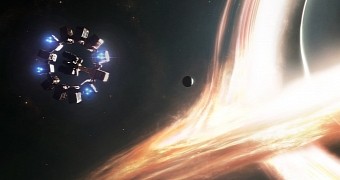Christopher Nolan’s ninth movie, the highly anticipated “Interstellar,” came out last year in November but is still keeping fans engaged in a long conversation about what really happened at the end. After all, this was a Nolan film, it couldn’t have ended any other way but with a potential twist.
The first draft of the script for “Interstellar” was penned by Jonathan Nolan, Chris’ brother and longtime collaborator, but for the final version used for the production, Chris made significant changes after long conversations with science advisor and producer Kip Thorne.
*Please note that this article contains spoilers, so if you’re yet to see the film, you might want to stop reading right now.*
The ending: confusing but happy
Thorne and Jonathan Nolan were promoting the upcoming release of “Interstellar” on Blu-Ray when this startling revelation was made, The Nerdist reports. Sure, it’s not uncommon for a script to go through various stages and thus include variations on the same story, but it seems that Chris changed everything by modifying the ending of Cooper’s story.
In the film version, after Cooper (Matthew McConaughey) sends Dr. Brand (Anne Hathaway) on her way to another potentially habitable planet, he falls through the black hole Gargantua into its singularity, in the hope that whatever data he might be able to pick up and send to Earth would help its people escape it before it’s too late.
Next up, Cooper finds himself in the fifth dimension, a tesseract that is made up of events from his timeline: time becomes physical and can thus be manipulated. He uses this to send a message to the young version of his daughter, who will only decrypt it when she’s older and thus be able to save mankind by leaving Earth.
Cooper himself is then allowed out of the tesseract and is rescued as he’s drifting through space. The movie ends with him leaving to find Dr. Brand, who, in the meantime, has started a colony on a new planet.
This might be a confusing and twisted ending, but it’s a happy one nonetheless: love transcends time and space, helps save humanity and find a new planet to move to after Earth. Cooper is reconciled with Murphy and will be reunited with Brand, or so it’s suggested.
The original ending was different
Apparently, Jonathan’s idea was very different from what it evolved to be: his ending “had the Einstien-Rosen bridge [colloquially, a wormhole] collapse when Cooper tries to send the data back,” he revealed at the press event.
If the wormhole collapsed, that means that almost the entire third act of the movie wouldn’t have existed: Cooper wouldn’t have fallen in the black hole and he wouldn’t have been able to contact his daughter, and mankind would have been doomed. He would have never made it back home because he would have found his demise in the black hole: the tragic tale of one man who wanted to be a hero for his children but had failed.
At the same time, moviegoers wouldn’t have gotten a happy ending, because they would have never known if the message Cooper tried to send reached home. The movie would have ended on the same note of bleak desperation and hopelessness it started with, with no solution offered for the problem of the dwindling resources on Earth.
Now, the question is, would you have liked it better with its original ending? Let us know in the comments.

 14 DAY TRIAL //
14 DAY TRIAL //